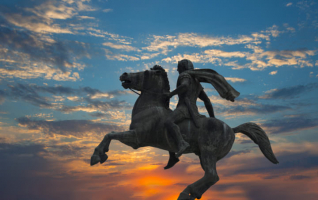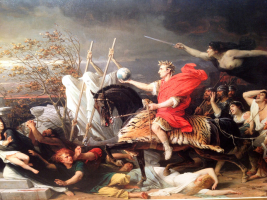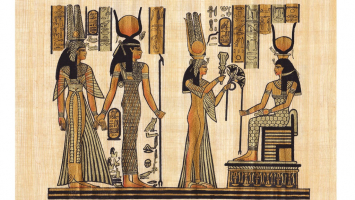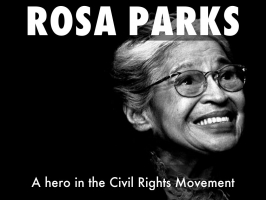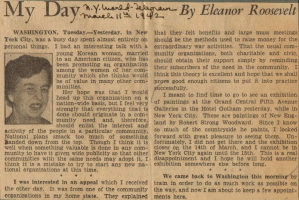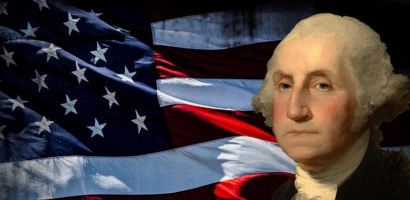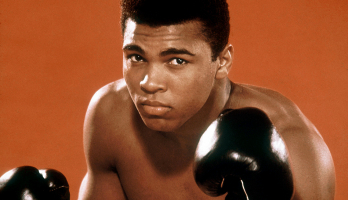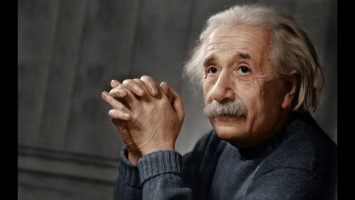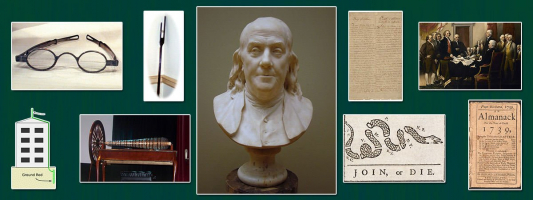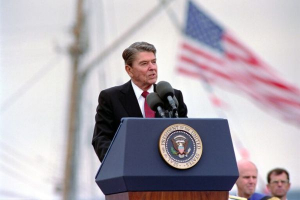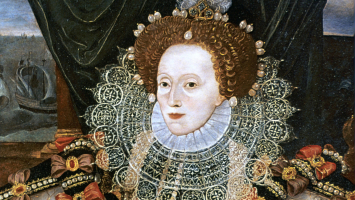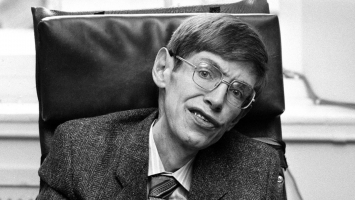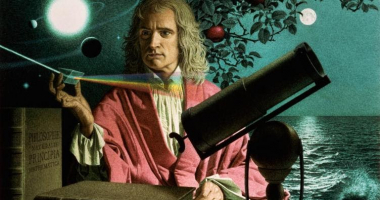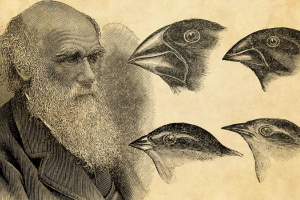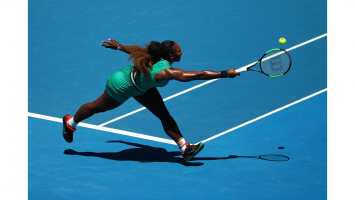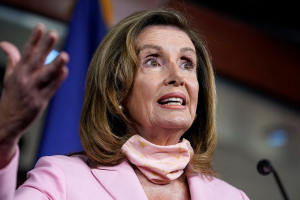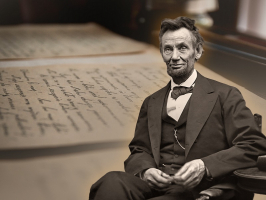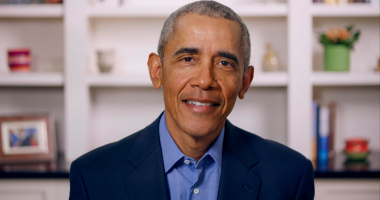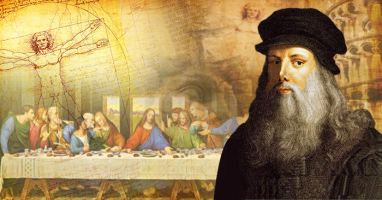Top 10 Major Accomplishments of Michael Jordan
Michael Jeffrey Jordan (born February 17, 1963), also known by his initials MJ, is a businessman and former professional basketball player from the United ... read more...States. He was a National Basketball Association (NBA) player for fifteen years, earning six NBA titles with the Chicago Bulls. Jordan is the major owner and chairman of the NBA's Charlotte Hornets as well as NASCAR Cup Series team 23XI Racing. "By acclamation, Michael Jordan is the greatest basketball player of all time," according to his biography on the official NBA website. In the 1980s and 1990s, he had an important role in popularizing the NBA around the world, becoming a global cultural icon in the process. Here are the 10 major accomplishments of Michael Jordan.
-
Jordan graduated from Emsley A. Laney High School in Wilmington, where he excelled in basketball, baseball, and football. During his sophomore year, he tried out for the basketball varsity team, but at 5 feet 11 inches (1.80 m), he was declared too short to play at that level. Harvest Leroy Smith, his taller friend, was the only sophomore on the team.
Jordan, driven to establish his worth, became the star of Laney's junior varsity team, averaging 40 points each game. He grew four inches (10 cm) and trained hard the next summer. Jordan averaged more than 25 points per game over his final two seasons of high school competition after winning a position on the varsity squad. As a senior, he was chosen to play in the 1981 McDonald's All-American Game, where he scored 30 points after averaging 27 points per game, 12 rebounds per game, and six assists per game during the season. Several collegiate basketball programs recruited Jordan, including Duke, North Carolina, South Carolina, Syracuse, and Virginia. He received a basketball scholarship to the University of North Carolina at Chapel Hill in 1981, where he studied cultural geography.
Jordan was named ACC Freshman of the Year as a freshman in coach Dean Smith's team-oriented system after averaging 13.4 points per game on 53.4 percent shooting (field goal percentage). He hit the game-winning jump jumper against Georgetown in the 1982 NCAA Championship game, which was led by future NBA rival Patrick Ewing. Jordan later hailed this shot as a watershed moment in his career. During his three seasons with the Tar Heels, he averaged 17.7 points per game on 54.0 percent shooting, 5.0 rebounds per game, and 1.8 assists per game.
Jordan was unanimously voted to the NCAA All-American First Team as a sophomore (1983) and junior (1984). Jordan departed North Carolina one year before his anticipated graduation to enter the 1984 NBA draft after earning the Naismith and Wooden College Player of the Year awards 1984. Jordan went to North Carolina to finish his degree, earning a Bachelor of Arts in geography in 1986.
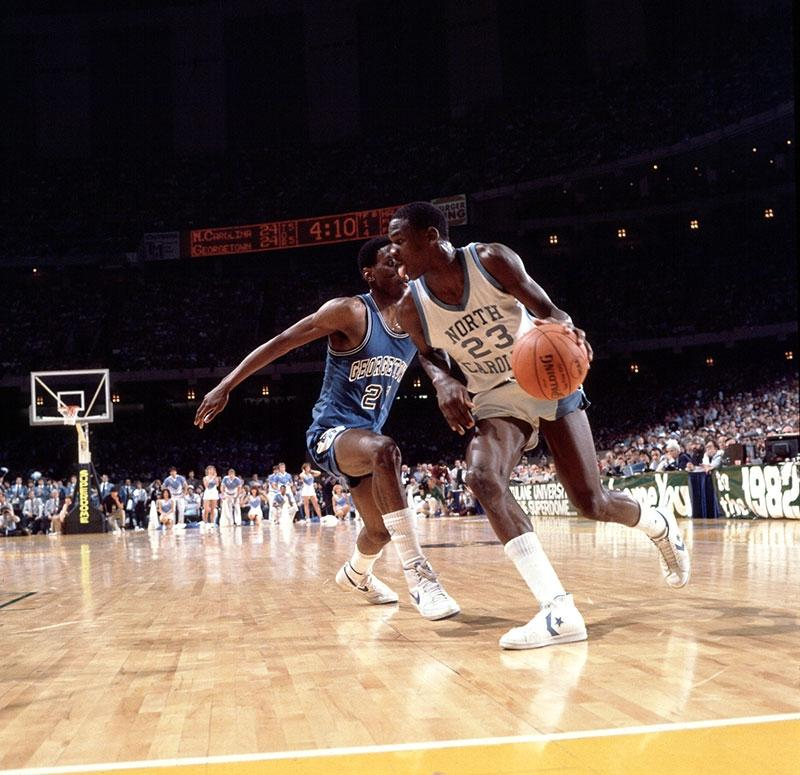
ncaa.com 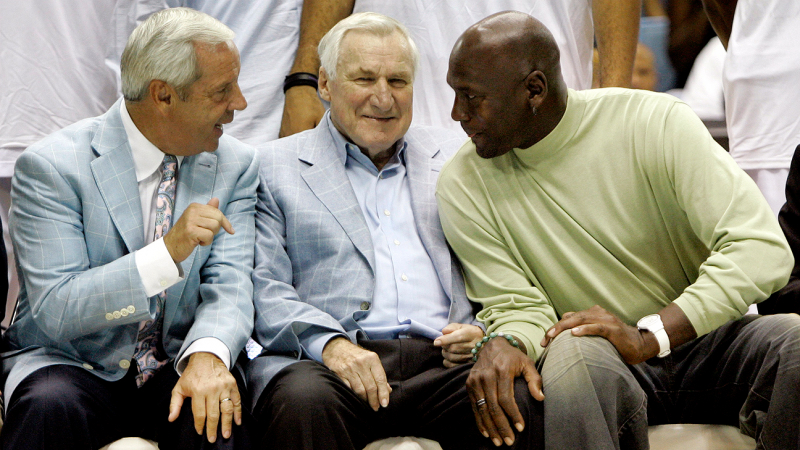
espn.com -
Jordan was chosen third overall in the 1984 NBA draft by the Chicago Bulls, ahead of Hakeem Olajuwon (Houston Rockets) and Sam Bowie (Portland Trail Blazers). One of the main reasons Jordan was not drafted sooner was that the first two teams needed a center. Trail Blazers general manager Stu Inman argued that it was not so much a matter of drafting a center as it was of selecting Bowie over Jordan, in part because Portland already had Clyde Drexler, a guard with similar skills to Jordan. ESPN named Bowie's selection by the Blazers as the worst draft pick in North American professional sports history, citing his injury-laden college career.
Jordan made his NBA debut on October 26, 1984, at Chicago Stadium, scoring 16 points. A ticket stub from the game sold at auction for $264,000 in 2021, breaking the record for a collectible ticket stub. Jordan averaged 28.2 points per game on 51.5 percent shooting as a rookie with the Bulls in 1984-85, helping a team that had won 35% of its games the previous three seasons become a playoff contender. Even in opposing arenas, he immediately became a crowd favorite.
Jordan was voted as an All-Star starter during his rookie season in his early NBA years (1984-1987). In November, The New York Times' Roy S. Johnson characterized him as "the phenomenal rookie of the Bulls", and Jordan appeared on the cover of Sports Illustrated with the headline "A Star Is Born" in December. During his rookie season, fans also chose Jordan as an All-Star starter. Before the 1985 NBA All-Star Game, rumors spread that numerous older players, led by Isiah Thomas, were unhappy with the amount of attention Jordan was receiving. This resulted in a Jordan "freeze-out," in which players refused to send the ball to him throughout the game. Jordan was generally unfazed by the controversy when he returned to regular season play, and he went on to be named NBA Rookie of the Year. The Bulls finished the season 38-44 and were eliminated in the first round of the playoffs by the Milwaukee Bucks in four games.
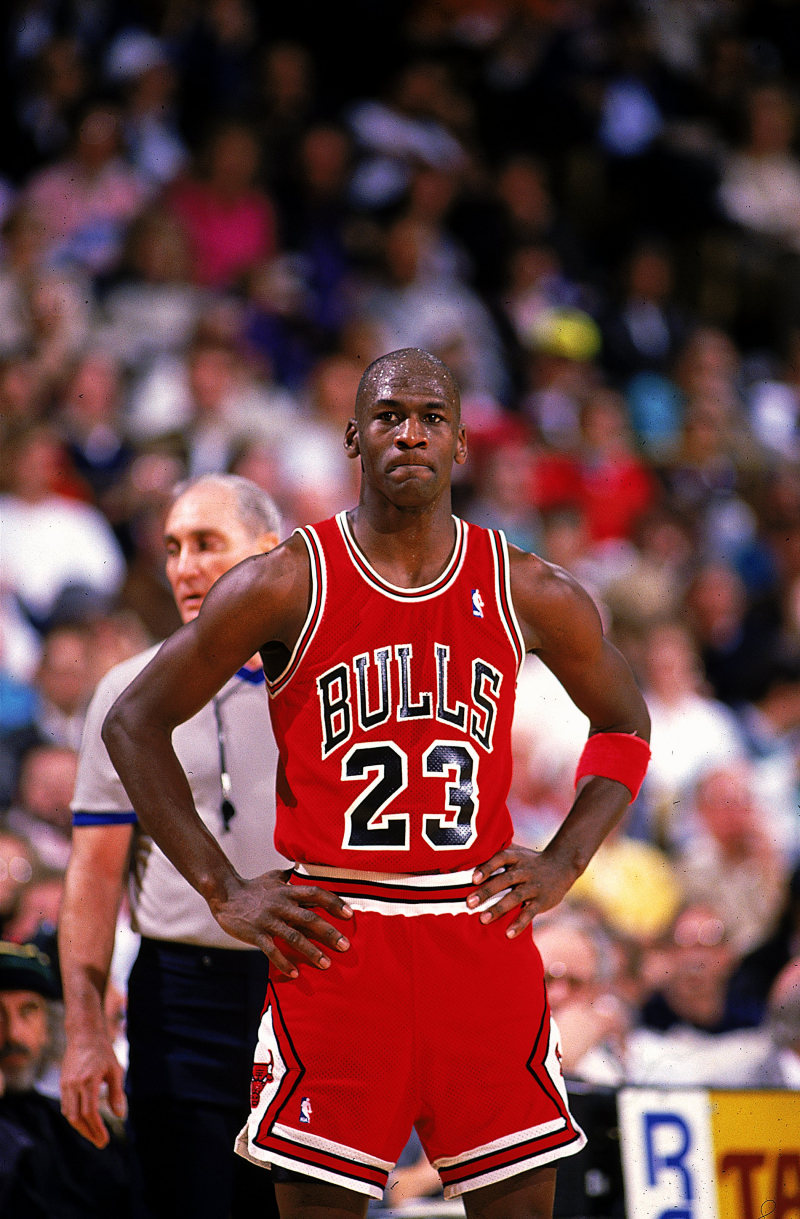
bleacherreport.com 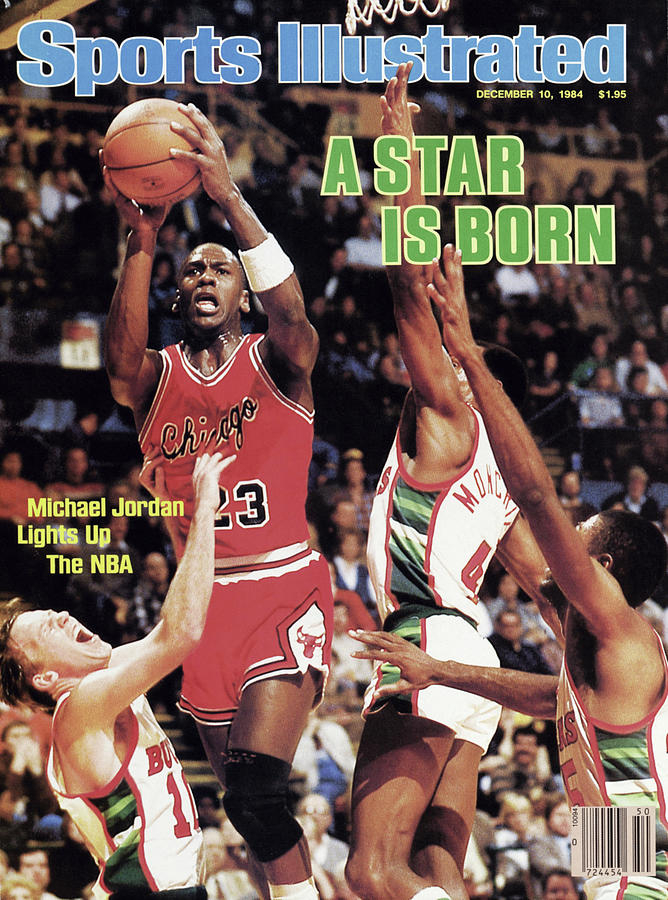
sicovers.com · In stock -
Jordan's 1985-86 season was cut short when he broke his foot in the third game of the season, resulting in a 64-game absence. Despite Jordan's injuries and a 30-52 record, the Bulls made the playoffs, having the fifth-worst record of any team to qualify for the playoffs in NBA history. Jordan healed in time for the postseason and played effectively upon his return. Jordan set the still-unbroken record for points in a playoff game with 63 in Game 2 against a Boston Celtics team that is widely regarded as one of the best in NBA history, but the Celtics went on to win the series.
Jordan fully recovered in time for the 1986-87 season and Jordan became the first player in NBA history to have 200 steals and 100 blocked shots in a season. He had one of the most prolific scoring seasons in NBA history, becoming the only player other than Wilt Chamberlain to score 3,000 points in a season, averaging 37.1 points per game on 48.2 percent shooting. Jordan also displayed his defensive skills by being the first player in NBA history to record 200 steals and 100 blocked shots in a season. Regardless of Jordan's achievements, Magic Johnson was named NBA's Most Valuable Player. Magic Johnson earned the NBA's Most Valuable Player Award despite Jordan's accomplishments. The Bulls won 40 games and made the playoffs for the third year in a row, but were swept by the Celtics.
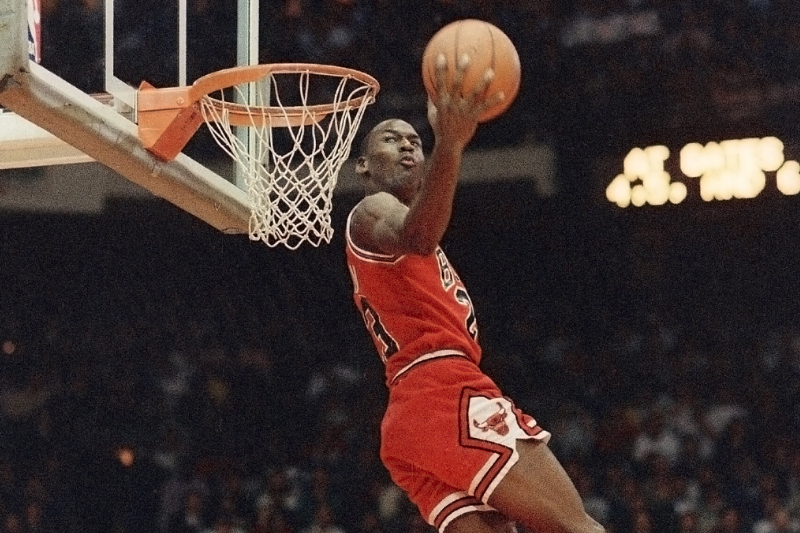
bleacherreport.com 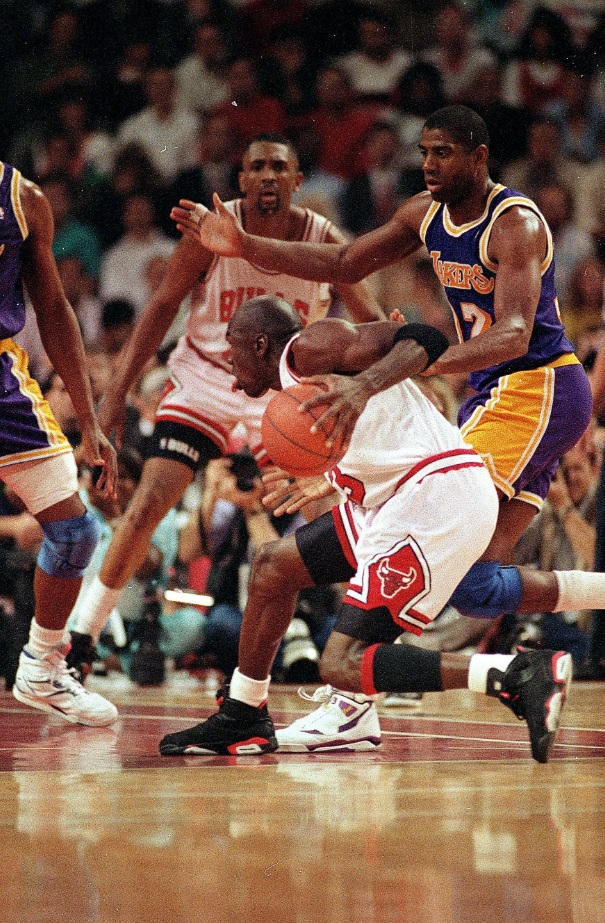
sportskeeda.com -
One of the major accomplishments of Michael Jordan is that he has the highest career PPG average in NBA history. He had one of the most prolific scoring seasons in NBA history in 1986-87, being the only player other than Wilt Chamberlain to score 3,000 points in a season, averaging 37.1 ppg on 48.2 percent shooting. Jordan led the league in scoring again in 1987-88, averaging 35.0 points per game on 53.5 percent shooting and winning his first league MVP Award. He was also named the NBA Defensive Player of the Year after averaging 1.6 blocks per game (bpg), 3.1 steals per game (spg), and leading the Bulls defense to the league's fewest points per game allowed.
Jordan topped the league in scoring again in 1988-89, averaging 32.5 points a game on 53.8 percent shooting from the field, along with 8 rebounds and 8 assists. During the season, Chicago's point guard, Sam Vincent, was having difficulty directing the offense, and Jordan expressed his displeasure with head coach Doug Collins, who would put Jordan at point guard. Jordan averaged 10 triple-doubles in eleven games as a point guard, with 33.6 ppg, 11.4 rpg, 10.8 apg, 2.9 spg, and 0.8 bpg on 51% shooting.
Jordan set a career-high with 69 points in a 117-113 away win over the Cavaliers in 1989-90. He led the league in scoring (33.6 ppg on 52.6 percent shooting), rebounding (6.9 rpg), and assists (6.3 apg). Jordan won his second MVP title in 1990-91 after averaging 31.5 points per game on 53.9 percent shooting, 6.0 rebounds per game, and 5.5 assists per game during the regular season. Jordan averaged 31.2 points per game on 56 percent shooting from the field, 11.4 assists per game, 6.6 rebounds per game, 2.8 steals per game, and 1.4 blocks per game in his first Finals appearance. Jordan received his first NBA Finals MVP title, and he sobbed as he held the Finals trophy. Jordan was awarded Finals MVP for the second year in a row, averaging 35.8 points per game, 4.8 rebounds per game, and 6.5 assists per game while shooting 52.6 percent from the field.
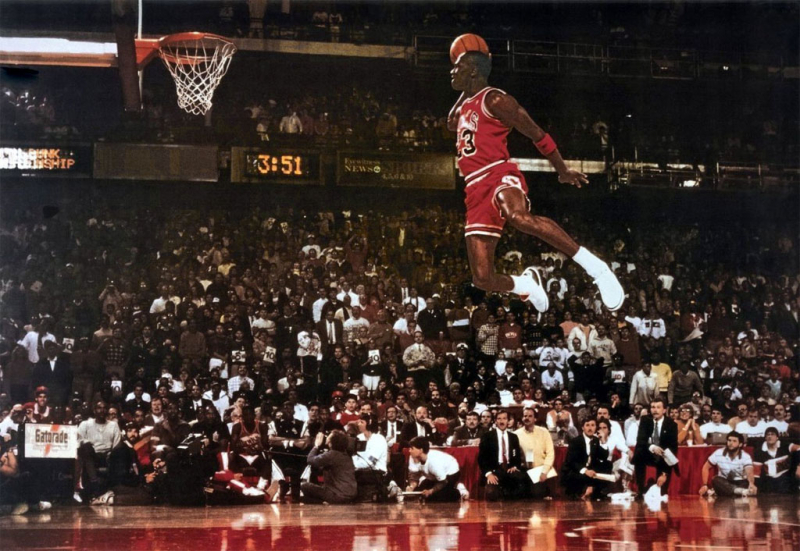
talentbacker.com 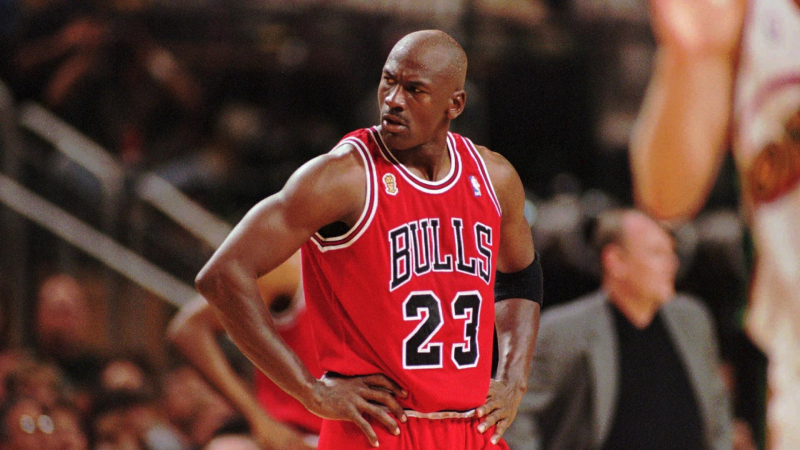
archyde.com -
In his career, Michael Jordan won two gold medals at the Olympics. Jordan made his national basketball team debut at the 1983 Pan American Games in Caracas, Venezuela. He led the team in scoring with 17.3 points per game as the United States, coached by Jack Hartman, won the gold medal. He won another gold medal in the 1984 Summer Olympics a year later. Bob Knight coached the 1984 U.S. team, which included Patrick Ewing, Sam Perkins, Chris Mullin, Steve Alford, and Wayman Tisdale. In the Olympic competition, the team went 8-0, averaging 95.4 points per game. Jordan led the team in scoring, averaging 17.1 points per game during the tournament.
Jordan was a member of the star-studded group known as the "Dream Team" in 1992, which also included Larry Bird and Magic Johnson. The 1992 United States men's Olympic basketball team, called the "Dream Team," was the first American Olympic team to include active National Basketball Association players (NBA). Some journalists have called the team "the greatest sports team ever assembled. The team went on to win two gold medals: one in the 1992 Tournament of the Americas and one in the 1992 Summer Olympics. The team defeated its opponents by an average of 44 points on its way to winning the gold medal against Croatia in the 1992 Summer Olympics in Barcelona. In 2009, the team was inducted into the United States Olympic Hall of Fame, the Naismith Memorial Basketball Hall of Fame in 2010, and the FIBA Hall of Fame in 2017. The Naismith Memorial Basketball Hall of Fame describes the team as "the greatest collection of basketball talent on the planet."
He was the first player in the Olympics to start all eight games, averaging 14.9 points per game, and finished second on the team in scoring. During Jordan's four tournament appearances in 1983, 1984, and 1992, the team never lost a single game.
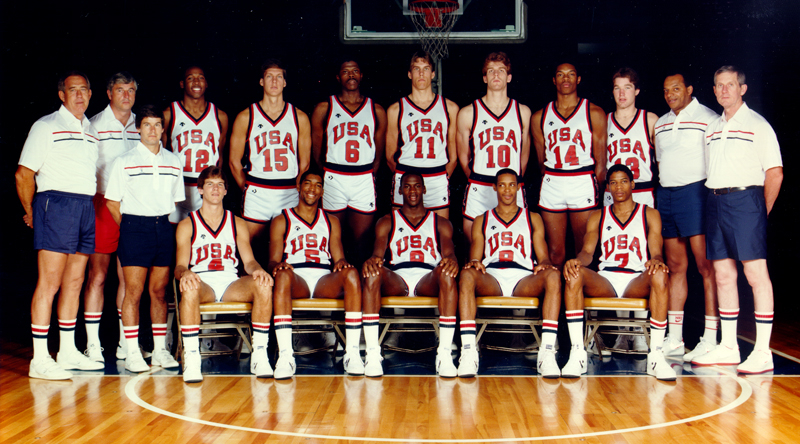
usab.com 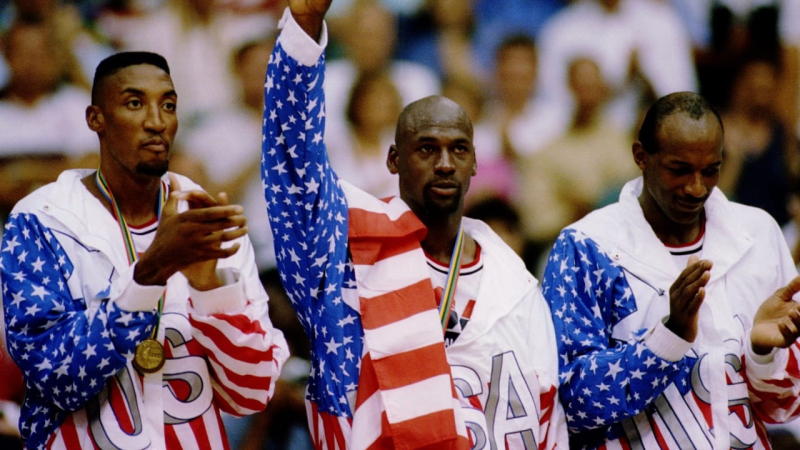
olympics.com -
Michael Jordan led the Chicago Bulls to three NBA championships from 1991 to 1993. Michael Jordan won his second MVP title in 1990-1991 after averaging 31.5 points per game on 53.9 percent shooting, 6.0 rebounds per game, and 5.5 assists per game during the regular season. For the first time in sixteen years, the Bulls finished first in their division and set a team record with 61 regular-season wins. The Bulls' play had improved as Scottie Pippen developed into an All-Star. In the first two rounds of the playoffs, the Bulls defeated the New York Knicks and the Philadelphia 76ers. They progressed to the Eastern Conference Finals, where they faced their rival, the Detroit Pistons; this time, the Bulls won in a four-game sweep.
For the first time in franchise history, the Bulls progressed to the NBA Finals, where they faced the Los Angeles Lakers, who included Magic Johnson and James Worthy, two strong opponents. The Bulls won the series four games to one and finished with a 15-2 playoff record. In Game 2, while attempting a slam, Jordan dodged a potential Sam Perkins block by switching the ball from his right hand to his left hand in mid-air to put the shot into the basket. Jordan averaged 31.2 points per game on 56 percent shooting from the field, 11.4 assists per game, 6.6 rebounds per game, 2.8 steals per game, and 1.4 blocks per game in his first Finals appearance. Jordan received his first NBA Finals MVP title, and he sobbed as he held the trophy.
Jordan and the Bulls maintained their dominance in the 1991-92 season, finishing with a 67-15 record, breaking the franchise record set in 1990-91. Jordan won his second consecutive MVP award, averaging 30.1 points per game, 6.4 rebounds per game, and 6.1 assists per game on 52 percent shooting. After defeating the New York Knicks in a grueling seven-game series in the second round of the playoffs and defeating the Cleveland Cavaliers in six games in the Conference Finals, the Bulls faced Clyde Drexler and the Portland Trail Blazers in the Finals.
Jordan set a Finals record with 35 points in the first half of the first game, including a record-setting six three-point field goals. He jogged down the court after the sixth three-pointer, shrugging as he looked courtside. Jordan appeared to be saying, "I can't believe I'm doing this," according to Marv Albert, who televised the game. The Bulls won Game 1 and went on to upset the Blazers in six games. Jordan was awarded Finals MVP for the second year in a row, averaging 35.8 points per game, 4.8 rebounds per game, and 6.5 assists per game while shooting 52.6 percent from the field.
Jordan set a Finals record with 35 points in the first half of the first game, including a record-setting six three-point field goals. The Bulls won Game 1 and went on to upset the Blazers in six games. Jordan was awarded Finals MVP for the second year in a row, averaging 35.8 points per game, 4.8 rebounds per game, and 6.5 assists per game while shooting 52.6 percent from the field. Jordan's string of straight MVP seasons ended in 1992-93, despite a 32.6 ppg, 6.7 rpg, and 5.5 apg season, including a second-place finish in Defensive Player of the Year voting, as he lost the trophy to his friend Charles Barkley, which disappointed him. Jordan and the Bulls met Barkley and the Phoenix Suns in the 1993 NBA Finals. The Bulls won their third NBA title on a game-winning basket by John Paxson and a last-second block by Horace Grant, but Jordan was the team's leader once again. During the six-game series, he averaged a Finals-record 41.0 points per game and became the first player in NBA history to earn three consecutive Finals MVP titles.
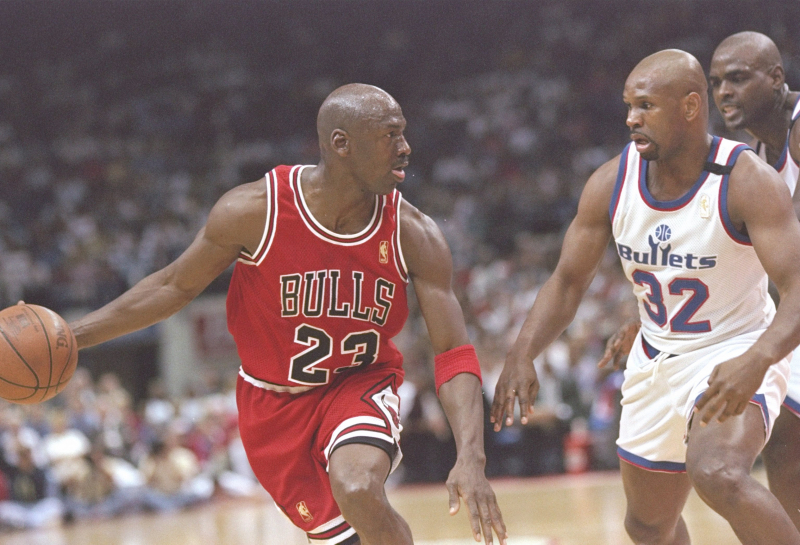
bleacherreport.com 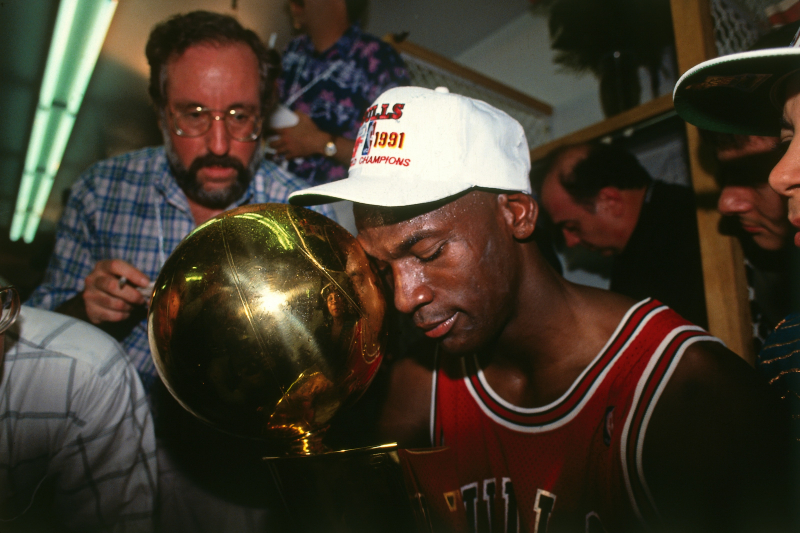
pippenainteasy.com -
From 1996 to 1998, Michael Jordan led the Chicago Bulls to three more NBA titles. The Bulls had a 69-11 record in 1996-97 but lost their final two games to conclude the season 69-13, missing out on a second consecutive 70-win season. The Bulls advanced to the NBA Finals once more, this time against the Utah Jazz. The series against the Jazz included two of Jordan's most memorable clutch moments. With a buzzer-beating jump shot, he won Game 1 for the Bulls. The Bulls won the series in six games, winning 90-88. Jordan was named Finals MVP for the fifth time in as many Finals appearances. During the 1997 NBA All-Star Game, Jordan recorded the first triple-double in All-Star Game history, although Glen Rice was named MVP.
Jordan and the Bulls finished the 1997-98 season with a 62-20 record. Jordan led the league in scoring with 28.7 points per game, earning him his seventh regular-season MVP award, as well as All-NBA First Team, First Defensive Team, and All-Star Game MVP awards. The Bulls won the Eastern Conference Championship for the third consecutive season, including a seven-game series victory over the Indiana Pacers in the Eastern Conference Finals; it was Jordan's first Game 7 appearance since the 1992 Eastern Conference Semifinals with the New York Knicks. After winning, they advanced to the Finals to face the Jazz again.
On June 14, 1998, the Bulls returned to the Delta Center for Game 6, leading the series 3-2. Jordan made a series of moves that are widely regarded as one of the finest clutch performances in NBA Finals history. With 10 seconds left, Jordan began to dribble right, then crossed across to his left, possibly shoving off Russell, though no foul was called. Jordan hit the game-winning shot of his Bulls career with 5.2 seconds remaining, a top-key jumper over a collapsing Russell to give Chicago an 87-86 advantage. Jordan was named Finals MVP for the second time, after averaging 33.5 points per game, including 45 in Game 6.
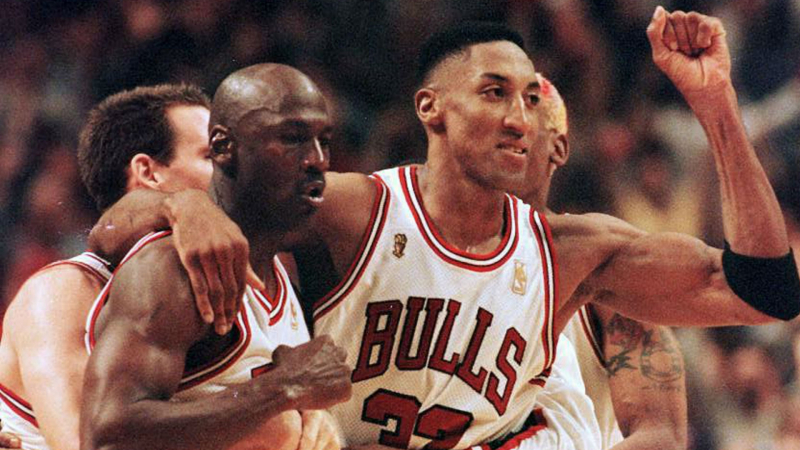
sportingnews.com 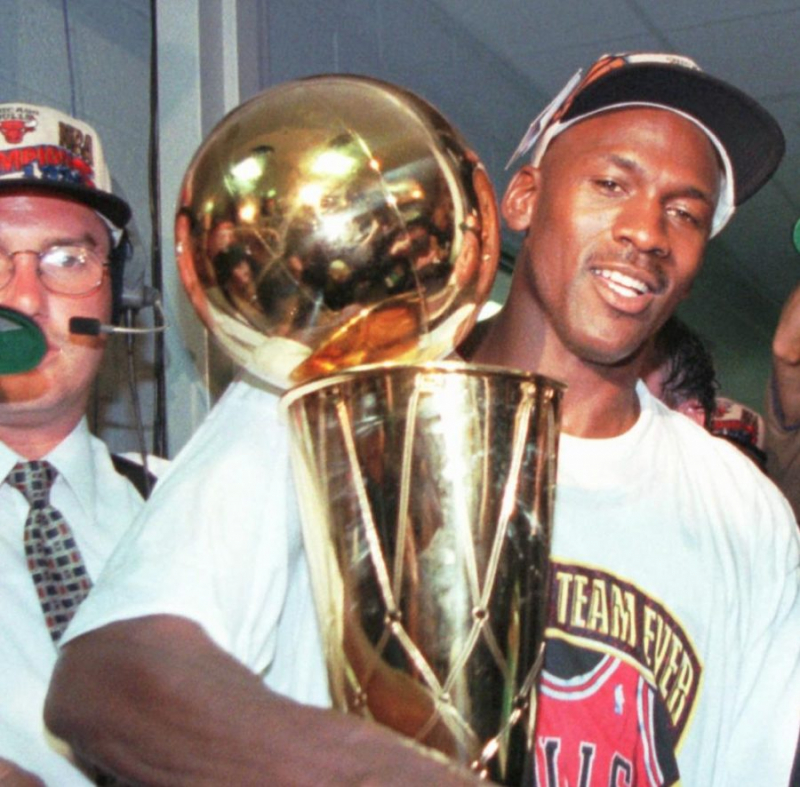
thechaparral.net -
One of the major accomplishments of Michael Jordan is that he won six-time NBA Finals MVP. Since the 1969 NBA Finals, the Bill Russell NBA Finals Most Valuable Player Award (previously known as the NBA Finals Most Valuable Player Award) has been granted annually. The award is decided by a jury of eleven media representatives who vote after the Finals conclude. The person with the most votes receives the award. Until 2005, the prize had a black trophy with a gold basketball-shaped sphere on top, similar to the Larry O'Brien Design, until a new trophy was produced to honor Bill Russell.
In the 1990-91 season, Jordan won his second MVP title after averaging 31.5 points per game on 53.9 percent shooting, 6.0 rebounds per game, and 5.5 assists per game during the regular season. For the first time in franchise history, the Bulls progressed to the NBA Finals, where they faced the Los Angeles Lakers, who included Magic Johnson and James Worthy, two strong opponents. The Bulls won the series four games to one and finished with a 15-2 playoff record. Jordan averaged 31.2 points per game on 56 percent shooting from the field, 11.4 assists per game, 6.6 rebounds per game, 2.8 steals per game, and 1.4 blocks per game in his first Finals appearance. Jordan was named NBA Finals MVP for the first time.
Jordan and the Bulls maintained their dominance in the 1991-92 season, finishing with a 67-15 record, breaking the franchise record set in 1990-91. Jordan set a Finals record with 35 points in the first half of the first game, including a record-setting six three-point field goals. Jordan was voted Finals MVP for the second year in a row, averaging 35.8 points per game, 4.8 rebounds per game, and 6.5 assists per game while shooting 52.6 percent from the field.
Jordan was voted Finals MVP for the fourth time in the 1995-96 season, surpassing Magic Johnson's three Finals MVP awards. Jordan scored 38 points in the 1996-97 season, including the game-winning 3-pointer with 25 seconds remaining. Jordan was named Finals MVP for the fifth time in as many Finals appearances.
Jordan topped the league in scoring with 28.7 points per game in the 1997-98 season, earning him his sixth regular-season MVP award, as well as All-NBA First Team, First Defensive Team, and All-Star Game MVP awards. Jordan hit the game-winning shot of his Bulls career, a top-key jumper over a collapsing Russell, to put Chicago up 87-86. Jordan and the Bulls won their sixth NBA title, completing the decade's second three-peat. Jordan was named Finals MVP for the second time, after averaging 33.5 points per game, including 45 in Game 6. Jordan's six Finals MVPs is a record.
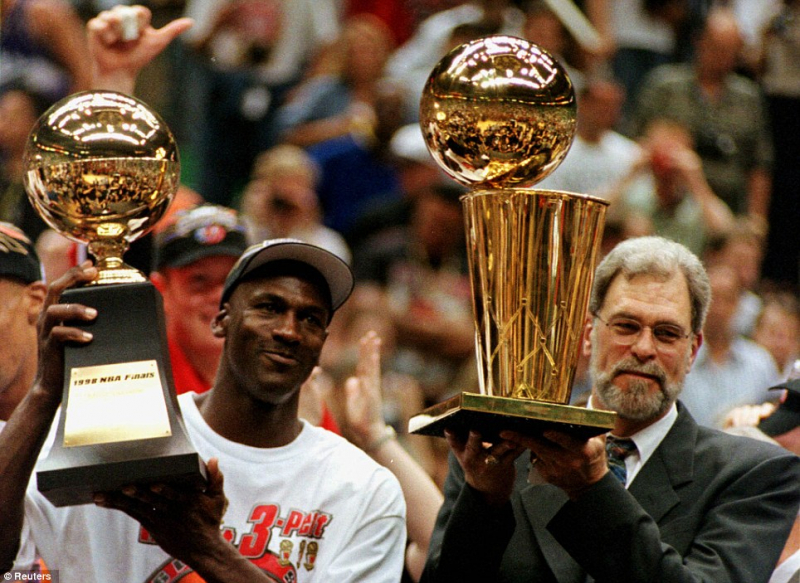
seo.org 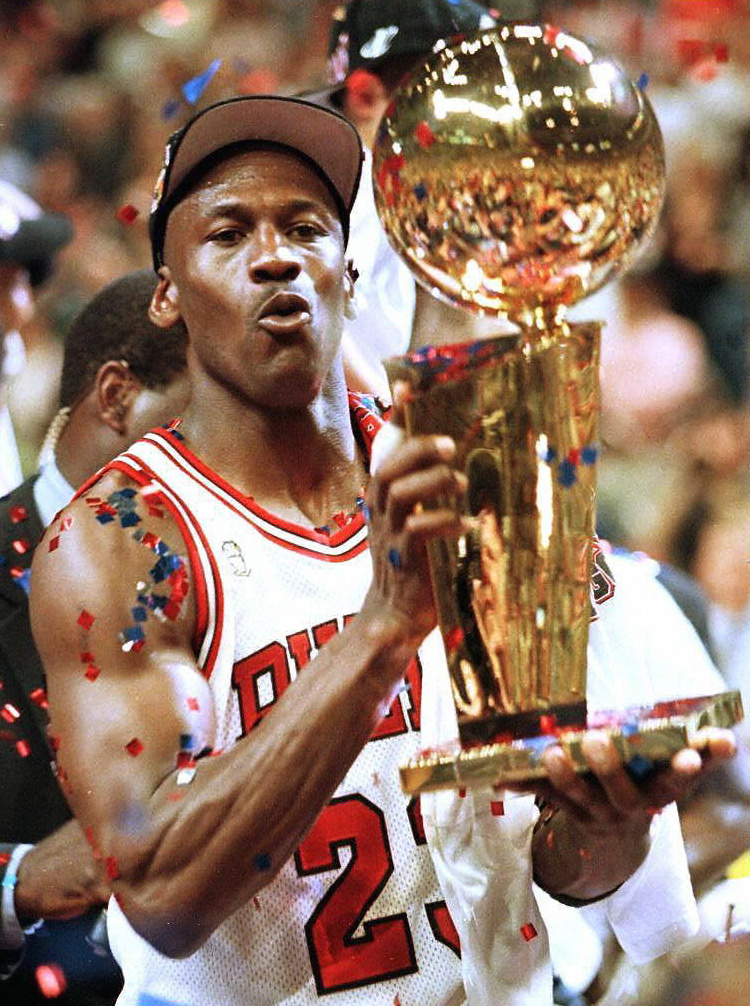
twitter.com -
Michael Jordan received the Presidential Medal of Freedom in 2016. The Presidential Medal of Freedom is an honor given by the President of the United States to those who have made "an especially meritorious contribution to the security or national interests of the United States, world peace, cultural or other significant public or private endeavors." The Presidential Medal of Freedom and the Congressional Gold Medal is the United States' highest civilian honors. The medal is not limited to citizens of the United States, and while it is a civilian award, it can also be given to military troops and worn on their uniforms. President John F. Kennedy introduced it in 1963, succeeding President Harry S. Truman's Medal of Freedom, which was established in 1945 to commemorate civilian service during World War II.
There are no specified criteria for getting the award with distinction; Executive Order 11085 only states that the honor should come in two degrees, and so the choice to give the higher degree is entirely at the president's discretion. President Obama remarked in 2017 that getting the medal with distinction reflects an additional level of respect in a class of people who are already held in the highest regard.
According to Wire, Michael Jordan accepted the Presidential Medal of Freedom on Tuesday at the White House, with Vin Scully, Kareem Abdul-Jabbar, and other American icons. Jordan, the Chicago Bulls icon and Charlotte Hornets owner, was one of 21 people to receive the medal, which is considered the highest civilian distinction that America can bestow on its citizens. Jordan is widely considered one of the best athletes of all time, and many consider him to be the greatest basketball player of all time, having won six championships with the Chicago Bulls and five MVP awards, among many other honors.
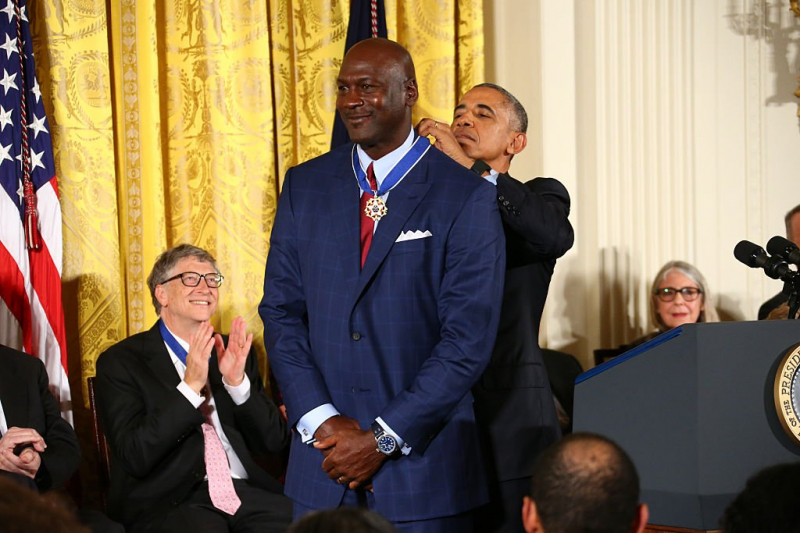
twitter.com 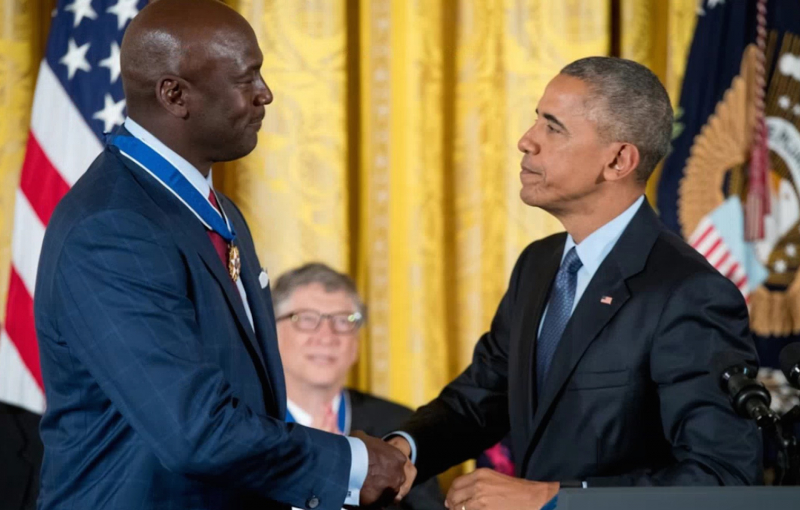
washingtonpost.com -
One of the major accomplishments of Michael Jordan is that Michael Jordan was voted one of the 50 Greatest Players in NBA History. The 50 Greatest Players in NBA History, commonly known as the NBA's 50th Anniversary All-Time Team, were picked in 1996 to commemorate the 50th anniversary of the National Basketball Association's creation (NBA). It was the league's third-anniversary team. A group of media representatives, past players and coaches, and current and previous general managers voted to select fifty players. As part of the celebration, media members chose the top 10 head coaches and top ten single-season teams in NBA history. The 50 players had to have spent at least part of their careers in the NBA and were chosen regardless of position.
Jordan is the most decorated player in NBA history, with five regular-season MVPs (tied for second with Bill Russell, only Abdul-Jabbar has more, with six), six Finals MVPs (NBA record), and three NBA All-Star Game MVPs. Jordan was named one of the top three regular-season MVP candidates ten times. In 1996, Michael Jordan was voted one of the 50 Greatest Players in NBA History, and in 2021, he was named to the NBA 75th Anniversary Team. Jordan is just one of seven players in history to have won an NCAA championship, an NBA title, and an Olympic gold medal (doing so twice with the United States men's basketball teams in 1984 and 1992). Jordan and Pippen are the only two players to have won six NBA Finals while playing for the same team since the ABANBA merger in 1976.
Many of Jordan's peers believe he is the best basketball player of all time. Jordan was named the greatest North American athlete of the twentieth century by an ESPN poll of journalists, athletes, and other sports luminaries in 1999, ahead of Babe Ruth and Muhammad Ali. Jordan was second to Ruth on the Associated Press's list of 20th-century athletes in December 1999. Furthermore, the Associated Press named him the greatest basketball player of the twentieth century. Jordan has also been on the front cover of Sports Illustrated 50 times. Jordan was selected as the greatest athlete of the past 50 years in the September 1996 issue of Sport, which was the publication's 50th-anniversary issue.
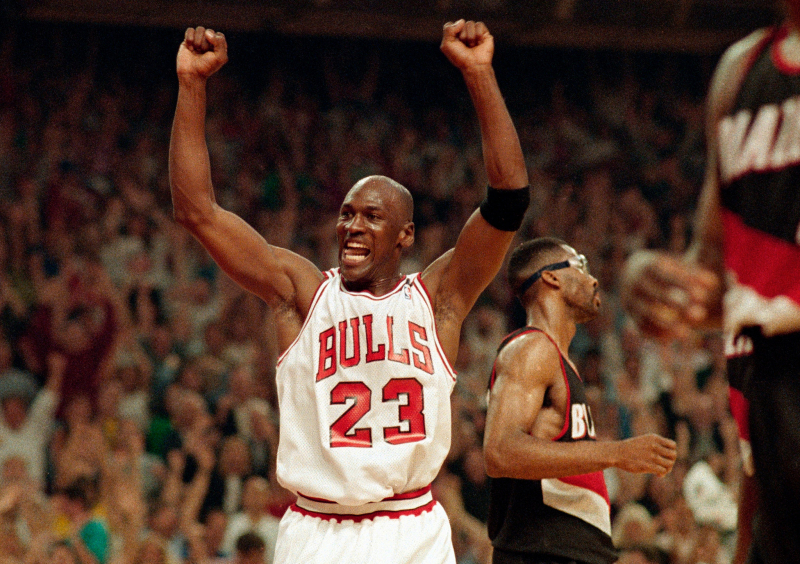
bajamarinefoods.com 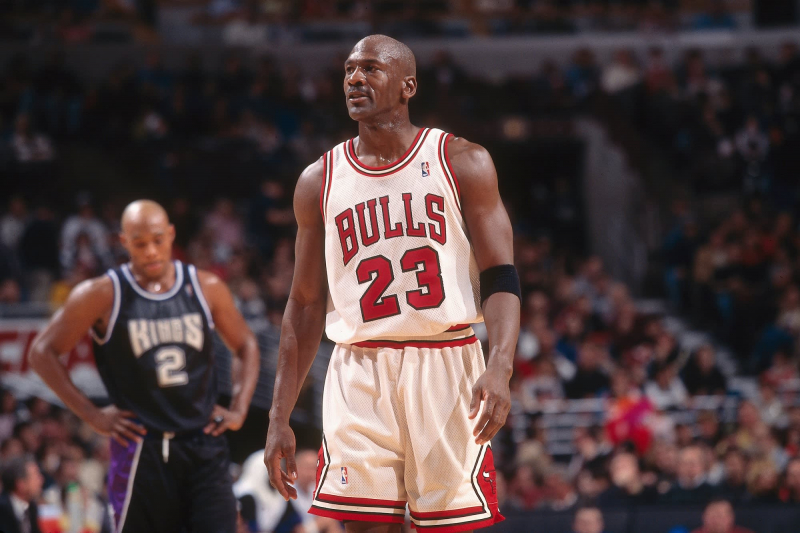
cnbc.com












